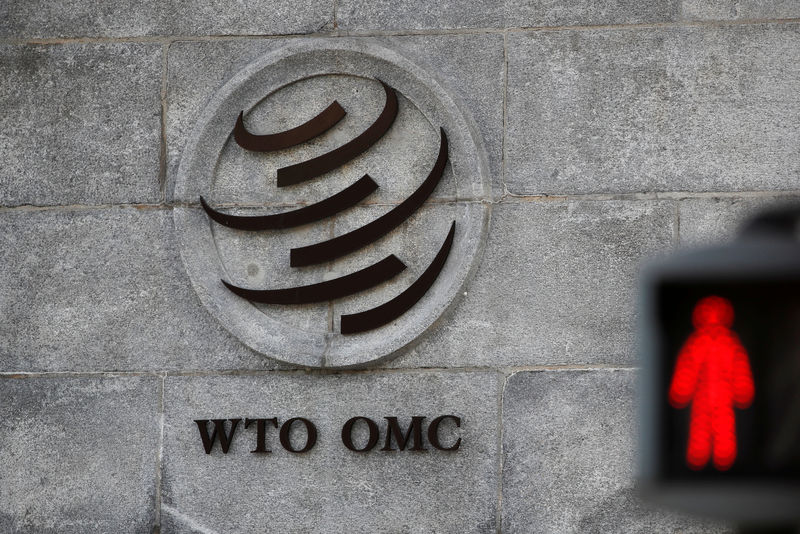By Philip Blenkinsop
BRUSSELS (Reuters) - President Donald Trump has hailed a ruling by the World Trade Organization (WTO) that gives the United States the right to hit Europe with tariffs, but his new-found satisfaction with the WTO's rules-based approach is expected to prove short-lived.
In the coming week, Washington will be hosting a delegation of Chinese trade officials in the latest face-to-face test of wills, by far his preferred way of resolving trade stand-offs.
Over 60% of analysts polled by Reuters see a deterioration of U.S-China trade ties - not least because the poll also showed a broad view that the yuan will slip to a new decade low against the U.S. dollar by year-end, fuelling U.S. accusations that China is manipulating its currency.
The WTO meanwhile welcomes up to 3,000 trade experts next week officially to debate how it should respond to a changing world, but they are all too aware that the Geneva-based body is facing the biggest threat in its 24-year history.
In just over two months, the WTO's appellate body, which rules on international trade disputes, will be left with only one judge after Washington's repeated refusal to accept new appointments.
For long the champion of world trade, the United States is threatening the very dispute settlement system that on Wednesday rewarded it with the right to levy tariffs on $7.5 billion of EU products over illegal subsidies to Airbus (PA:AIR).
The U.S. Trade Representative's (USTR) office welcomed the award and Trump described it as a "nice win". But few are under any illusions that Washington is about to adopt a more consensual course.
"If you read the press statement from USTR... it's the best advertisement for the WTO appellate body that anyone could possibly have written," an EU diplomat said of a text that sounded on the surface like a ringing endorsement of it.
"But I think we have to assume there will be no appellate body after Dec. 10."
The European Union will likely win similar damages next year in a parallel case over subsidies for U.S. planemaker Boeing (N:BA). But for the time being the EU is the loser, the champion of rules-based trade exposed as a rule breaker and now facing U.S. tariffs on a range of its exports.
"This is awkward for Europe," said one non-EU diplomat. "The United States are supposed to be the bad guys."
Dispute settlement is not the only field where multilateralism is under threat. The WTO's "Doha Round" of negotiations, designed to lower global trade barriers, stalled long ago, but the organization has pressed ahead with talks on e-commerce and fish subsidies.
However, the fish talks have also stalled because the 164 WTO members cannot agree on who should chair the committee to discuss the issue.
GLOBAL RULES ON SUBSIDIES
In the 15-year-old aircraft dispute, both sides have expressed a willingness to reach a settlement, but this is unlikely to happen any time soon, and certainly not before the United States expands its trade offensive with new tariffs on EU products on Oct. 18.
At the same time as the two battle over aircraft subsidies, they and Japan are in talks about revising global rules on subsidies as a whole, hoping to find a formula to curtail Chinese backing of its state-controlled companies. Two years of talks have so far not yielded results.
"Some of the parties have realized that strong and comprehensive discipline on subsidies to rein in China risks unintentionally also including their own domestic subsidies," said Hosuk Lee-Makayama, director of trade think tank ECIPE.
WHAT TO WATCH FOR NEXT WEEK
All eyes will be on Federal Reserve Chair Jerome Powell when he speaks in Denver on Tuesday. Till now, he has described the pair of Fed rate cuts since July as a "mid-cycle adjustment" rather than the start of a full-blown easing campaign. That stance is being tested by the southward turn in the latest round of data on the U.S. economy, although Friday's read-out of moderate September jobs growth may reassure some.
Whether any progress is being made on the effort to lift U.S. inflation should also become clearer in the week ahead, with data on both producer and consumer prices due out.
Next week is a big one for Germany-watchers, with industrial output, industrial orders and trade figures. In the UK, August GDP data on Thursday should give some idea of whether the UK is heading for a negative Q3 GDP reading and a technical recession.
In Paris, the OECD think-tank will release on Wednesday much-anticipated plans to overhaul international tax rules aimed at ensuring that big internet companies pay a bigger share.
A LAST THOUGHT
Why does cheese always seem to get caught up in transatlantic trade rows? Some answers in this story:

https://uk.reuters.com/article/uk-wto-aircraft-cheese/cheesed-off-european-dairy-producers-dismayed-at-u-s-tariffs-idUKKBN1WI250